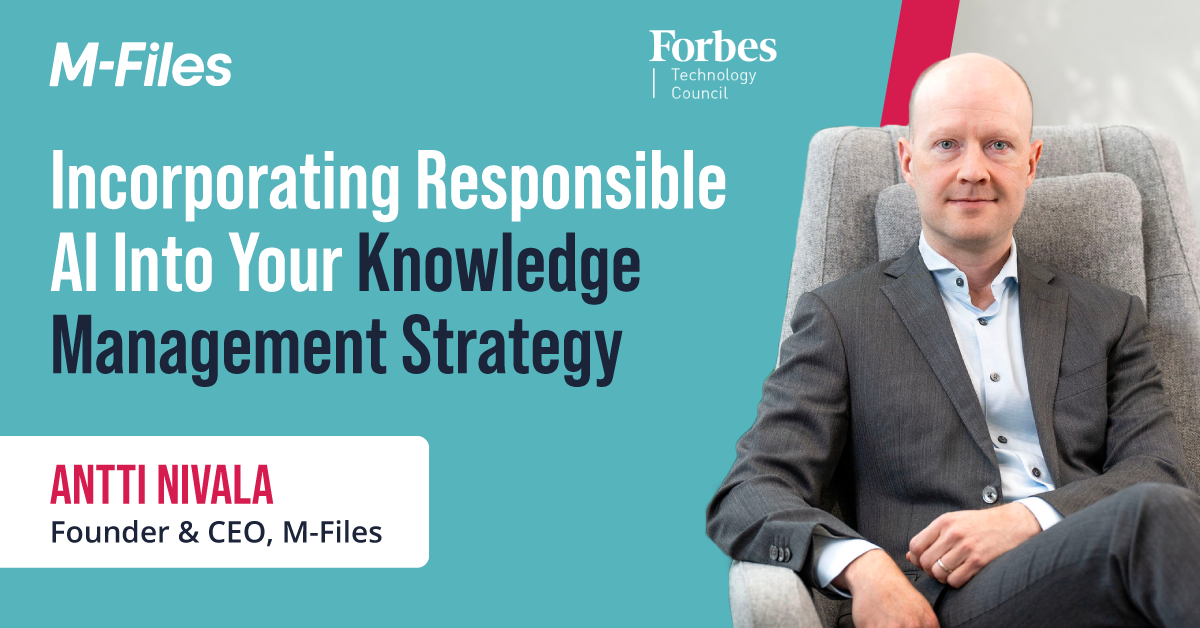Incorporating AI Into Your Knowledge Management Strategy

M-Files Founder and CEO Antti Nivala shares practical insights on how to incorporate responsible Artificial Intelligence (AI) into an organization's knowledge management (KM) strategy in his newest contributed article published in Forbes.
Antti shares, "Knowledge is power. It holds the context and insight required to drive business forward. However, knowledge is often trapped in data silos—stuck on a server or lost in a forgotten folder. That valuable information, such as a deep understanding of customer preferences or unique trends, holds enormous potential only AI can likely uncover."
Artificial Intelligence (AI) has the capability to uncover deep insights and information dispersed across documents, emails, and conversations. For many organizations, it serves as the intelligence that drives problem-solving and enhances the efficiency of knowledge workers. However, with greater intelligence, comes significant responsibility.
With many feeling the need to keep up with the latest advancements in AI as a competitive advantage, it is necessary organizations take their time to understand its impact on the business. As the pace of innovation increases, so does the need for a balance between innovation and security.
In the article, Antti discusses how assessing three specific aspects of data - Connectivity, Curation and
Confidentiality, should be considered by organizations to make informed decisions when implementing AI across their information management strategies. Read the full article in Forbes Tech Council.
Connectivity
"AI can help overcome the challenge of information overload head-on and unlock the value of unstructured data. But to be effective, we must ensure AI is working as intended and relaying accurate information.
Identifying vendors committed to deploying accurate tools to minimize AI hallucinations can also help your enterprise from falling victim."
Curation
"With the influx of information generated across an organization, it’s important to understand what data AI models are trained on to ensure the information being leveraged is current, accurate and valuable.
Having a better understanding of how your data is curated and interacts with AI can ensure you are confident in the way you leverage the context of documents and interact with your organization's knowledge."
Confidentiality
"Even though adopting AI has many benefits, it inevitably raises concerns about data privacy and confidentiality.
Enterprises shouldn’t be afraid to examine vendor AI usage policies to make sure AI models can comply with their organization’s information security protocols and aren’t being trained on their data without their written consent."
Ensuring Guidelines
"To get the most out of AI in your information management strategy, it’s important to establish clear guidelines and standards around AI’s usage while enabling successful AI deployment with capabilities for connectivity, curation and confidentiality. A metadata structure within your information management system also supports the need for data consistency and helps you identify, manage and enforce AI data policies as it provides an information model specific to each customer’s content."
Progressive organizations need to leverage their capacity to assimilate information and extract insights. AI has the power to revolutionize our knowledge work processes, liberating employees from monotonous, time-consuming tasks and converting information into a catalyst for growth. However, it is crucial for us to evaluate and oversee the impact of our AI and information technology to avoid potential pitfalls.
For the full article, please visit Forbes Tech Council.
Published August 27th, 2024.









